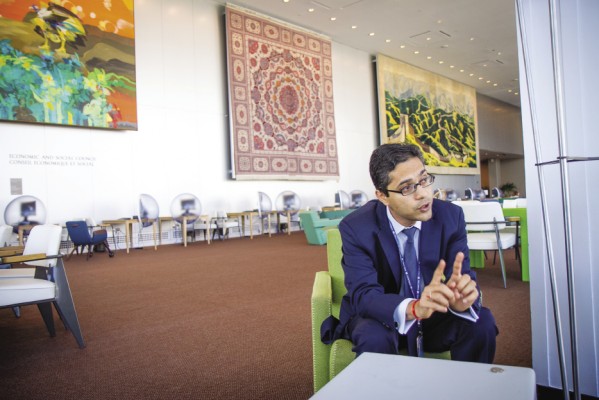
When Kumar Anuraj Jha returned home to Nepal with an MA in conflict transformation from Eastern Mennonite University in 2007, he was hired as a child protection advisor by the United Nations Mission in Nepal. The decade-long armed conflict between government forces and Maoist fighters had officially ended a year earlier, while Jha was midway through his graduate studies as a Fulbright Scholar at EMU’s Center for Justice and Peacebuilding (CJP).
But the tough part of returning Nepal to some semblance of normality had just begun. Jha found himself responsible for the social re-integration of the Maoists’ 3,000 child soldiers (i.e., those under age 18) slated for release under the 2006 Comprehensive Peace Accord.
To Jha’s surprise, many of these youthful soldiers didn’t want to be freed. “They didn’t see it the way the international community did – they wanted to stay with the Maoists; it was a source of identity and pride for them,” said Jha.
In hindsight, Jha wishes the UN had been able to have access to the child soldiers long before the Maoists released them into civilian life. With more time, he and his colleagues might have been able to address their concerns.
As it was, Jha’s team was under pressure – other aspects of the peace process hinged on the release of the child soldiers – so they had to push the young people into deciding among 40 UN- sponsored options, including training in a healthcare profession, starting small businesses with micro-loans, and vocational training (to be, for example, electricians or cooks).
Jha thinks the reintegration package was one of the most comprehensive that the UN has ever put together, but the years of child soldiering had not prepared these young people to be receptive to what they were being offered.
Every action has unintended consequences
Six years later, sitting in a spacious waterfront room used for informal conversations at UN headquarters in New York City, Jha ponders the gap between the ideal application of peacebuilding principles and the realities that peace practitioners often face.
“There is no action that does not have unintended consequences, no matter what you do and how well intentioned you are,” says Jha, who moved in 2010 from Nepal to NYC, where he now works on issues related to children and armed conflict, with a focus on Africa.* “The UN’s efforts to free and rehabilitate child soldiers in Nepal were perceived as coercive by many of the soldiers – causing them to feel unsettled and full of anxiety.”
Jha looks burdened by this memory, adding: “It’s a struggle to put theories into practice. You try to make the best choice at that time, at that moment. The peace process will never be perfect.”
Jha derives satisfaction from interactions with his colleagues, whom he describes as highly intelligent, multilingual people from around the world, who often bring special expertise to their UN work. But he adds that the overall system tends to be characterized by a “culture of competitiveness,” based on jostling for funding, authority and responsibilities.
Reflecting on his CJP years, Jha says he values the theoretical frameworks he gained, giving him an ability to analyze conflicts and to identify what part of a theory is useful and applicable in a given situation. “I’m better able to look at a situation and make sense of it.”
Jha says CJP’s emphasis on building and bridging relationships in any situation is one of his biggest take-aways; he credits “the culture and values of Mennonites” for inculcating a particular style of leadership in himself and other graduates.
Likes Mennonite way of empowering others
“CJP taught us to be self-reflective and to recognize that it’s never one person who has transformed something – hundreds of people contribute. And the more you acknowledge that and expand the circle, the better the outcome will be.”
In the Mennonite tradition, he says, “the emphasis is on enabling others, empowering others, encouraging others.” He adds that students sense Mennonites promote and teach peacebuilding because of their long-standing values, not just for professional reasons. (Jha, a Hindu, is married to a 2010 CJP graduate, Jill Landis, a Mennonite. They have two daughters.)
“It’s distressing for me to see people who act as if they have all the answers. It’s harmful. It’s very difficult to do this peacebuilding work in a way that isn’t damaging. The need to be humble, that’s one of the most important lessons I got at CJP.”